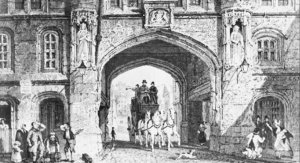]
 |
| "Royal Mail" coach operated from the Reindeer and the Saracens Head. |
 |
| 1828 Pigot & Co Directory |
Before the arrival of the railways getting from point A to point B wasn't easy. Walking was probably the most common form of travel for most people, travelling by horse was for those who could afford it but the more fortunate would travel by Mail Coach.
The Mail Coach came into being in the late 18th century. The period from 1810 to 1830 was the "Golden Age" of coach travel, road surfaces had improved and coaches could attain average speeds of 12 mph.
This is a record of the Journey by mail coach from Lincoln to London, before the arrival of the railway:
"Leaving Lincoln by the mail at 2 p.m., supping at Peterborough at 9, the traveller, after composing himself for an uneasy slumber about Yaxley Barracks (from whence the waters of Whittlesea Mere might be seen shimmering in the moonlight), grumbling through a weary night at the obstinate legs of his opposite neighbour, and sorely pinched in the small of the back, was only delivered, cold and cross, at the Spread Eagle, Gracechurch Street, about 5 the next morning. He had then the choice of going to bed, with feet like ice, in a fireless room, opening out on an open-air gallery (where a box was fixed for the barber to shave travellers), or of sulking in a fusty coffee-room till the waiters were astir and the world was aired." - The Lincoln Pocket Guide, Sir Charles H J Anderson.
Fifteen hours to London may seem slow to us today but in the early 19th century it must have been quite rapid.
People made their wills before they were "received into the York stage-coach, which performed the journey to London (if God permitted) in four days."
People made their wills before they were "received into the York stage-coach, which performed the journey to London (if God permitted) in four days."
In 1786 the cost of a coach from Lincoln to London via Newark, Grantham, Stamford, etc. was £1 11s 6d (£1.58) for inside passengers and 15s 9d (£0.79) for the less fortunate on the outside. To put the price into perspective, in 1797 an agricultural labourer earned £30.03 per annum and surgeons £174.95 per annum.
 |
| Denbigh Hall bridge which took the railway over Watling Street |
With the arrival of the railways some enterprising coach operators saw an opportunity to take advantage of the faster method of travel. In April 1838 Denbigh Hall Station opened at Denbigh near what is now Milton Keynes. Denbigh Hall was a temporary terminus of the London and Birmingham railway. A coach named "The Railway" departed from Lincoln's Saracen's Head Inn at Six o'clock Monday to Saturday mornings, breakfasting at eight at Sleaford, passing through Folkingham at 9.15, Bourne at 10.15, Greatford 11.00, Stamford 11.30, Duddington 12.00pm, Weldon 1.00, Kettering 2.00, Northampton for dinner at 3.30, arriving at Denbigh Hall at 6.15. The 48 miles from there to Euston station, London took 2 hours by steam train.
Denbigh Hall Station closed in November 1838 when the railway continued north west to Birmingham.
Denbigh Hall Station closed in November 1838 when the railway continued north west to Birmingham.
It was noted in the Lincolnshire Chronicle of 10 May 1839, "Horses at our great April fair at Lincoln have not sold so well as usual, neither can they be expected, for the railways are superseding coaches and posting, and in a few years we shall neither require horses nor the oats to feed them".
 |
| Travelling by coach wasn't always plain sailing, Lincolnshire Chronicle 13 July 1838 |
By 1841 the Lincoln Railway Coach was connecting at Blisworth railway station, an eleven hour journey. Long distance coaching from Lincoln had more or less ceased by the late 1840s.
The demise of long distance coach travel had a retrograde effect on taverns and inns, in particular the hamlet of Spital-in-the-Street where the number of coaches supported two inns.
The demise of long distance coach travel had a retrograde effect on taverns and inns, in particular the hamlet of Spital-in-the-Street where the number of coaches supported two inns.
Click here to learn more about travel by mail coach
Please visit our Facebook page to read more about Lincoln & Lincolnshire, its places and people. You are welcome to contribute anything relevant to Lincoln.